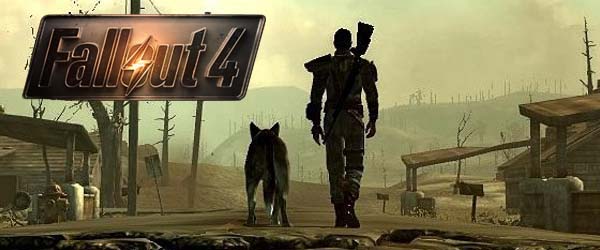
"Pirate Lord Captain Gregle, Slayer of Ancients and World-Renowned Trapeeze Artist" sounds like a pretty legendary character, right? Well, he wasn't. In fact, he was a very lucky, over-achieving halfling rogue in a short-lived campaign of Dungeons & Dragons. I rolled for the character's initial stats, got fairly low constitution, and then rolled the minimum value for hit dice for the first few levels. The result was a sixth-level character with a pathetic sixteen max hit points! A single lucky shot from virtually any enemy could be an instant KO for that character, and getting engaged in melee would practically be a death sentence. While some power gamers may scoff at the idea, rage against their dice, and then remake their character with a standard array and average HP, I decided to run with it and role play the hell out of little Gregle.
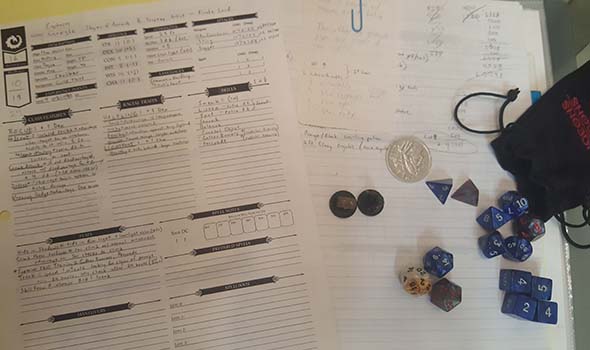
Character sheet for "Pirate Lord Captain Gregle, Slayer of Ancients and World-Renowned Trapeeze Artist"
With the low initial constitution, I focused my character around stealth abilities, disengagement and evasion tactics, and ranged attacks, and continued to improve those skills as I leveled. Knowing that he's a pathetic weakling, Gregle overcompensated by being a very flamboyant braggart and narcissist (I took inspiration from Stephen Colbert), and thought that he was more charming than he actually was. He routinely hid in the shadows, taking pot shots at vulnerable enemies and racking up kill steals from afar while his two warrior companions did most of the heavy-lifting. He would occasionally disarm a trap or unlock a door, and once used a clever trick to pacify (and subjugate) an entire band of pirates. He then took credit for much of the party's achievements.
Despite having only slightly above average charisma, he leaned on his halfling luck to succeed on some charisma checks and make himself a bit of a celebrity with the local townies for his exaggerated heroics. He reveled in the unprecedented access to their community that the locals provided, and he reveled in the adulant gifts that they showered upon him, happily hoarding it all in his bag of holding. The other party members never called him out on it in public, since they were just happy to have the cooperation of the locals.
While the other players and DM enjoyed Gregle's antics, their characters only barely tolerated his presence. During the actual adventuring, he was constantly getting into trouble and needing to be bailed out by his fellow adventurers. He once falsely awakened the party during his night watch after mistaking a wyvern for a dragon. In another instance, he was KO'd while using spider-boots to walk up a ceiling to pursue an enemy that had climbed a rope to escape the conflict, and he became stuck on the ceiling, forcing the party to figure out a way to get him down. They reluctantly obliged to help him, since Gregle was the possessor of the party's bag of holding, and was actually good at sneaking around to perform recon, unlocking doors, disarming traps, coming up with clever plans to avoid direct conflict, and other appropriately roguish things.
Gregle was one of the most fun characters that I've ever played, and he provided me with one of my most entertaining gaming experiences. This is the power of role playing to a character's strengths and weaknesses. It's a power that Bethesda shows no interest in utilizing for Fallout 4.
Out of the vault and into the wastes
I have to give credit to Bethesda for making one really interesting decision with Fallout 4: the game starts in a time period prior to the Great War that triggered the nuclear holocaust, and so it explores as yet unseen elements of the series' backstory. Or at least, it does for all of fifteen minutes. Much like Fallout 3, the pre-war gameplay and time that you spend in the vault is really just an extended tutorial and character-creation process. But unlike Fallout 3, it doesn't give enough time and depth to those settings to make the player legitimately care about them or the characters in them.
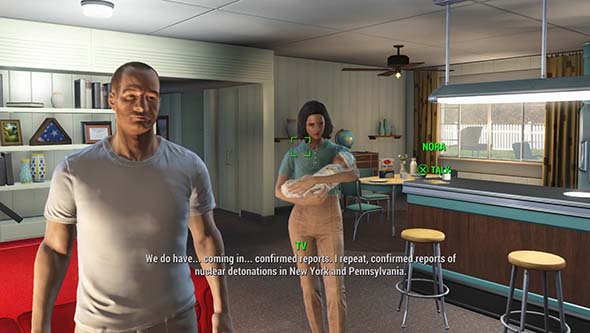
You don't spend enough time in your pre-war home or vault to develop any attachment to the place or people.
After creating your character and setting your S.P.E.C.I.A.L. stats, you and your spouse immediately flee with your infant child to the neighborhood vault. Once inside, you're handed the trademark silly superhero pajama jumpsuit and then promptly cryogenically frozen. You awake to witness your spouse get murdered and child kidnapped by apparent raiders, but then get frozen again. Then you awake again to do the combat tutorial against radroaches before leaving the vault and starting the game proper.
You spend virtually no time in the pre-war time period; you don't bond at all with your spouse or child; you don't establish any connections with your home or neighbors. There is absolutely no emotional bond between the player and what is lost in the war. So when the game drops you in the wasteland with a dead spouse, a missing child, and a quest to track down the kidnapper/killer, it does so without creating any emotional connection or investment for the player. I could go to Concord and then to Diamond City and search for my son, or I could just wander off in any random direction fighting raiders and painstakingly building my own little settlement out in the middle of nowhere using salvaged car tires and scrapped raider armor. Fallout 4 doesn't waste any time taking a nose-dive into the open world limbo.
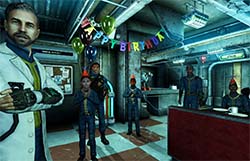
Fallout 3 simulated an entire childhood in the
vault, with friends, family, and even bullies.
Compare this against Fallout 3's prologue. It spent a considerably longer time developing your character and immersing you in the vault. Your dad (voiced by Liam Neeson) plays with you as a baby to teach movement and camera controls, he teaches you how to shoot, and throws a surprise birthday party for you. You interact with a childhood friend, other vault dwellers, and even a bully in order to tutorialize persuasion and speech checks and learn how to solve conflicts without violence. You even go to school and take a test to determine your default skills. In the short amount of time in the vault, you've lived a montage of an entire life.
With only a little bit of buy-in from the player, Fallout 3's Vault 101 becomes a living, breathing place populated with people who you can relate to and care about. You, as a player, have an investment in it and the characters that inhabit it. So when shit happens and you have to leave the vault, it's a monumental moment, and the events of your life, and the decisions that you've made, will shape your character's development over the rest of the game.
Even Skyrim gave the player interesting role-play decisions in its tutorial by required your character to make an immediate decision to follow the imperials or the Stormcloaks (though the scenario makes that decision a pretty one-sided one). And your initial choices of weapons and battle tactics would level up those specific skills; thus, starting the character down a path towards specializing in those skills as the game progressed (though you were completely free to change all that if you want).
And Fallout 4 has a perfect opportunity to take that father / son dynamic from Fallout 3, and invert it! The game could have opened with the birth of the baby. Since Bethesda had to record dialogue for multiple names for the player character, they could just as easily have done the same with the child's name. The doctor could hand you a paper with "This Year's Popular Baby Names", and you could chose one of those names that were explicitly recorded in dialogue. You could even be given the option to type your own name and replace the child's name with "my son" in dialogue. You could fill out the child's name and your own character's name on the birth certificate. Naming the baby would create a sense of ownership and connection to the child that might help encourage the player to pursue the main quest.

Fallout 4's vault serves only as a combat tutorial with no depth, emotional resonance, or meaningful decisions.
But it doesn't have to stop there... [More]
0b31d11f-77e0-4ddd-b277-8b1e013b818d|0|.0
Tags:Fallout, Fallout 4, Bethesda, RPG, Boston, commonwealth, minuteman, minutemen, wasteland, post-apocalypse, nuclear weapon, nuclear war, NPC, Dogmeat, power armor, crafting, ludonarrative dissonance, open world, sandbox, raider, synth, android, slavery, underground railroad, freedom, rights, morality, ethics, family
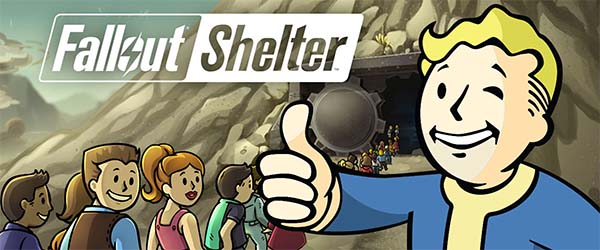
My recent forays into mobile and casual games has been pretty disappointing. I'm becoming pretty pessimistic about these games, and hoped that Bethesda's Fallout Shelter might have the production quality and complexity of design to keep my attention. After all, Bethesda doesn't seem to be using this game as a simple delivery service for micro-transactions and actually seemed to be taking it seriously as a video game.
Fallout Shelter does, indeed feel like a more honest attempt to make a true video game for mobile devices. Some of the telltale features of casual games are present, such as rewards for daily play and some micro-transactions. But the game isn't constantly badgering you to buy micro-transactions, and the player can't spend money to accelerate the basic production cycles of the game (as is the case in most other casual, resource-production games of this type). In fact, there are plenty of high-level items that can be unlocked fairly early via in-game rewards without having to spend any money at all.
Fallout from a different perspective
The player assumes the role of a vault overseer in the Fallout universe and must build your vault and manage the dwellers that live inside. Each dweller is assigned to a specific room in order to produce resources. There are three resources: power, water, and food, that are each produced in various rooms that you can build in the vault. Each resource has its own unique utility. Power allows rooms to keep functioning. Food keeps the dwellers from losing HP. Water keeps the dwellers from suffering radiation poisoning. And bottle caps are used as the primary currency for building rooms and buying or selling equipment. I don't get the sense that the different resources are just a way of forcing the player to grind more to pad out the length of the game, and the costs of new items stay fairly low and reasonable. There is still grinding, but it's nowhere near as painful or tedious as in Trexels, which has a very similar basic gameplay mechanic. Management is also more complicated than in Trexels, since each dweller has specific S.P.E.C.I.A.L. stats that affect how quickly the room will produce resources. So it matters which room a dweller is assigned to.
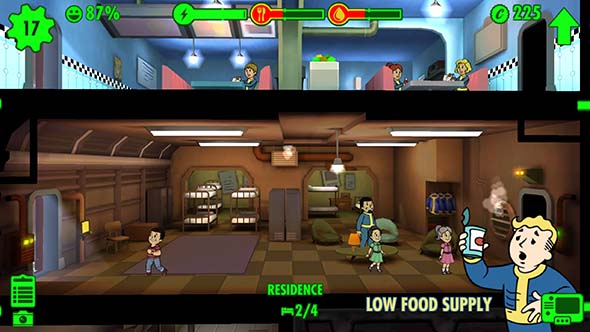
The different resources have different utility, which makes the game feel less like a grind.
Worked rooms will produce resources every so often, but they can also be rushed if you're desperate. Or if you want extra money, or if you want experience for your dwellers, or if you just want surplus resources, or if you're just bored. Rushing production seems to be highly encouraged by the game mechanics, since it is the fastest path to bottle caps, experience, and resources! The tradeoff is that you risk triggering an "incident" whenever you rush production. Incidents can include the room breaking out in fire, or radroaches or mole rats infesting the room. Both will do gradual damage to any dwellers in the room while the dwellers try to fight them off. Incidents are easy enough to deal with, especially if you have a hefty stockpile of stimpacks, and if all your dwellers are equipped with weapons. The risk of incidents will increase each time you attempt to rush, and so everytime I load up a vault, I usually collect all the resources already accumulated, then I repeatedly rush all the production rooms until the risk of incidents goes up to 60% or more. And once you get a medbay and laboratory, you can produce (and rush) stimpacks and rad-aways to heal your dwellers from incidents, which makes this cycle almost trivially easy to maintain.
Incidents can also occur randomly, and you'll even see the occasional random raider attack... [More]
c4477ea0-6ff6-42c3-bc43-e9d325496f82|1|4.0
Tags:Fallout, Fallout Shelter, Bethesda, vault, post-apocalypse, wasteland, raider, resources, dwellers, mobile, mobile gaming
In my Skyrim review, I pretty much only considered the base game content. But the game does include three paid DLC packs that are fairly hit-or-miss. Instead of making my original review longer and more complicated (it's already long enough), I'll lump all the DLC reviews into this one post.
As a reminder, I am playing the PS3 version of the game, so my review applies specifically to the console version. Many (if not all) of my complaints can probably be relieved on the PC by mods. Sadly, I do not have access to mods...
Table of contents
- Hearthfire adds more meaningless time-sinks
- Stupid vampires create genuine motivation in Dawnguard
- Dragonborn hides worthwhile rewards behind an unmotivated adventure and horde of glitches
[More]
2c074229-7d4d-4ffe-ad8a-14159815013f|0|.0
Tags:The Elder Scrolls, The Elder Scrolls V: Skyrim, Skyrim, Bethesda, RPG, action, fantasy, open world, DLC, hearthfire, house, family, pet, dawnguard, vampire, Serana, dragonborn
Skyrim is one of the biggest names of this console generation. It's already earned the status of "classic" in some circles. It's over three years old now, and I've been playing it (and its DLC) on my PS3 off and on for much of that time. I've been wanting to write a review, but I just never felt that I had progressed far enough into the game to have a full idea of its overall quality. Considering how long the game's been out, and how successful it's been both critically and commercially, this is more of a retrospective than a true review, since I'm not going to influence anybody's purchase decision. All I can do at this point is talk about what I think he game did right, and what it did wrong, so that future games can hopefully improve on the formula.
After years of playing, I've finally made enough progress with various characters to feel comfortable writing a review. With the recent rumors that Fallout 4 may reuse Skyrim's engine, I feel that this review actually has some relevance still.
The game also includes DLC, which I have reviewed separately in a another post.
The engine finally works! … Mostly …
It seems like Bethesda’s open-world game engine is finally maturing. It’s still a little rough around the edges and has its fair share of bugs and glitches (particularly pertaining to companion characters and home customization), but I was amazed when I realized that, for the first time with a Bethesda RPG, I had been playing the game for weeks without needing to consult the online wiki to find a work-around for a glitch that rendered any characters missing, quests inaccessible, or items missing! With Oblivion and the two Fallout games, it didn’t take more than a few hours of gameplay to start running into such glitches.
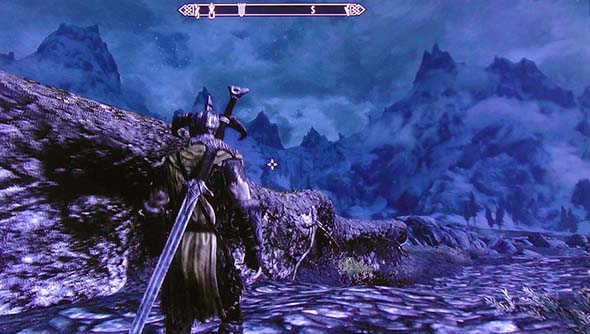
The large, open world is finally stable enough to be more fun than frustrating.
My roommate actually had a game-breaking glitch that prevented him from saving after the initial character creation (including auto-saves), so he lost a whole Saturday afternoon’s worth of progress and had to restart the game. That one was a doozy, and admittedly the worst bug that I've experienced so far in any Bethesda game! But these problems have been the exception rather than the norm.
So that’s one big check mark in Skyrim’s favor compared to previous Bethesda games!
Removing level-scaling makes leveling a reward rather than a punishment
Believe it or not, it wasn't the frequency of glitches that deterred me from finishing Oblivion; it was the level-scaling system. On paper it seemed like a good idea. Leveling up the enemies, quests, and loot so that the game is consistently challenging and rewards are consistently worthwhile sure sounded like a good idea!
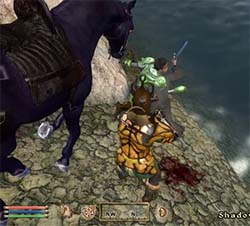
Oblivion's level-scaling resulted in a world overrun by trolls, glass-armored bandits, and Daedra.
But in practice, it turned out to be completely ruinous. Leveling felt more like a punishment than a reward, as everything in the world also became progressively harder. This issue was compounded by the poor balance between different classes. If you weren't leveling your combat skills, and had created a class built around - say - Mercantile, Athletics, and Acrobatics then you could easily over-level early in the game simply by walking around and talking to NPCs, only to get slaughtered in the first Oblivion gate because the enemies were stronger than you and you couldn't talk your way out of the fight.
Skyrim fortunately, does not retain Oblivion's strict level-scaling feature.
Some quests, enemies, and loot are scaled, but most things are not (or they're only slightly scaled). Now, bandits are always just bandits, overpowering enemies start the game overpowered, and the world does not suddenly become exclusively populated by trolls and Daedra halfway through the game. "Dungeon bosses" do seem to scale with the character’s level. As you start going up in levels, you’ll start to notice that the grunts in the dungeons are trivial to fight and leave worthless loot. You’ll actually feel like all that leveling has paid off! Then you get to the "boss" at the end of the dungeon and might get your ass handed to you and have to reload several times.
Hard areas should be hard, and easy areas should be easy. It's just mildly annoying that this game gives you no indication which it’s going to be until you’re already a mile underground, and the difficulty varies wildly - even within a single dungeon crawl.
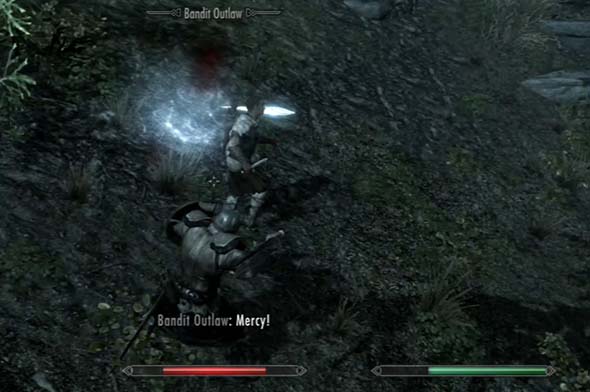
Most ambient encounters aren't scaled to the player's level, so bandits always remain just bandits.
Removing the class skills frees up the player to develop whatever skills he or she needs without the compulsion to micro-manage leveling class skills versus non-class skills. Character development feels much more natural and organic, and you can change your specialization at any time if circumstances change ... [More]
452deb1e-0838-4ffe-a6da-528d57ba6804|3|2.0
Tags:The Elder Scrolls, The Elder Scrolls V: Skyrim, Skyrim, Bethesda, RPG, action, fantasy, open world, dragon, dragonborn, magic, user interface, NPC, AI
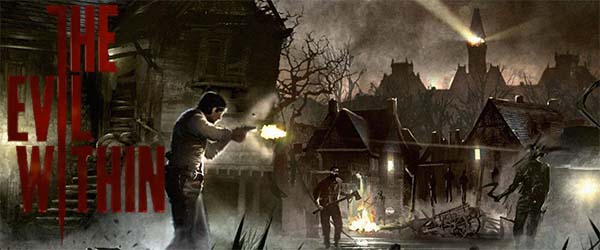
I had some really high hopes for The Evil Within. It looked like Shinji Mikami was trying to bridge a gap between the survival horror trappings of the original Resident Evil and the more action-oriented shooter gameplay style of Resident Evil 4. The former was a slower-paced game that emphasized open-ended exploration, puzzle-solving, and resource management in a horror setting. The latter game dropped most of its horror ambitions in favor of totally campy action shooter schlock. Early trailers for Evil Within looked it would hit a good balance between the two styles.
I didn't jump right on this game at release because I saw some mediocre reviews and heard that it failed to deliver on its promises. After booting up the game, waiting for an hour-and-a-half for the 4.7 GB update file to install (what did this update do? Tack on a whole new game?!), navigating the slick title menu, and then proceeding through the first few chapters, I verified that the game does indeed fail considerably as a horror game.
But it is worth noting that The Evil Within (unlike Resident Evil 4 and Shadows of the Damned) does seem to be making a legitimate attempt at being a horror game, rather than just an action shooter with zombies. It just doesn't really succeed at this goal.
Early levels in particular are full of exceptional lighting and ambient effects that really help to build an ominous atmosphere. The addition of stealth mechanics does put a greater emphasis on avoiding direct conflict and encouraging a more cautious approach (compared to RE4's guns-a-blazing attitude).
I've heard a lot of complaints that this game's story doesn't make sense and is stupid. I think most of these people didn't finish the game (or at least get to the point around chapter 10 where the story is explained). The story makes sense. The problem is that the game is very disjoint and never really builds on these foundations.
The game's narrative causes the character to jump (seemingly at random) from place to place - even within a single chapter. Each new place quickly starts to feel like a narrow-scope set-piece for an action scene rather than any kind of terrifying world. The game and individual chapters lack narrative cohesion and unifying design. There's very little opportunity for the game to allow open exploration or atmosphere-building, since the whole game feels like a collection of randomly-thrown-together set pieces and battle puzzles. So even though the overall story makes sense (in retrospect), the individual scene and level-progression doesn't.
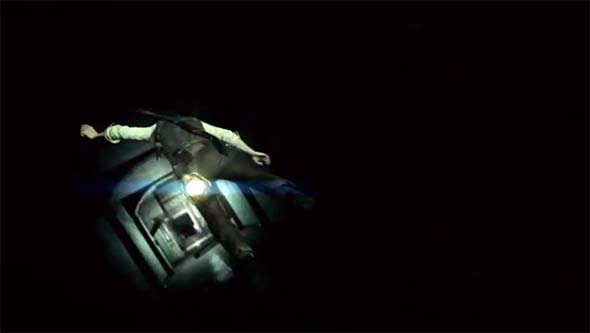
Reality is being warped, resulting in some trippy effects, but a very disjoint sense of progression.
The designers seem to be trying to mimic the Otherworld of Silent Hill, but the transition is so jarring, and the places feel so completely unrelated to one another, that it just doesn't work. You get through a pain in the ass, trap-infested maze while dodging monsters, only to be teleported to another maze area when you reach the exit! "OK, we're done with this area, let's just go to some other random challenge room." There's no sense of ever achieving anything because you're rarely ever allowed to actually go to the places that you are trying so hard to get to. And once that sense of futility sets in, any fear starts to dissipate. You're no longer concerned with getting out or saving yourself or even progressing the story because you realize that you can't achieve anything without the game giving it to you.
It's a real shame too, because some of these reality-warping mind tricks might be very effective if they were organically integrated into the flow of the game. I especially liked one bit in which a character falls down a bottomless pit, only to have the whole world re-orient itself so that the walls become the floor. So instead of falling to his death, he harmlessly rolls to a stop. Unfortunately, these effects lack subtly and feel random... [More]
ce16d91f-e2af-4e72-9f81-822136d27e6a|2|3.5
Tags:The Evil Within, Bethesda, Tango Gameworks, survival horror, action, shooter, stealth, Sebastian Castellanos, zombies, mental institution, Shinji Mikami, Resident Evil 4
|

| 12 | | | | | | | 60 | | 11 | | | | | | | 55 | | 10 | | | | | | | 50 | | 09 | | | | | | | 45 | | 08 | | | | | | | 40 | | 07 | | | | | | | 35 | | 06 | | | | | | | 30 | | 05 | | | | | | | 25 | | 04 | | | | | | | 20 | | 03 | | | | | | | 15 | | 02 | | | | | | | 10 | | 01 | | | | | | | 05 |
|